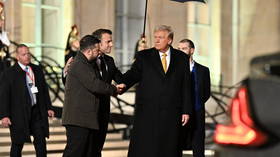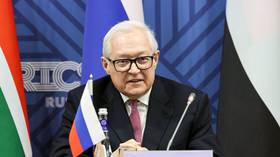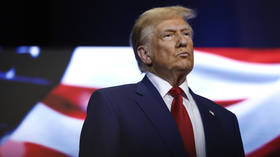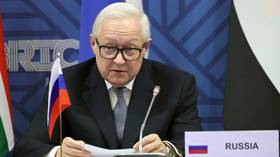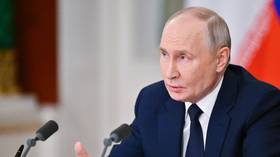Trump is a nightmare for the EU in more ways than one
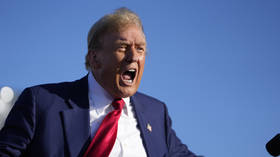
For a man his age, incoming US president Donald Trump has a knack for cultivating a bad-boy image. Refreshingly direct to the point of rude honesty, or dishonesty, as the case may be, he has no time for polite circumlocution. His threats are harsh, his demands unvarnished, including toward Washington’s so-called allies in Europe, which really are, at best, clients, and, more realistically, just vassals. In that spirit of candid, no-frills domination, Trump already has a long record of threatening NATO, which he sees – plausibly – as a scam in which European members fleece the US to free-ride on its insane (but that’s a different story…) military spending.
Or, in the genteel English still cultivated at The Economist, “through NATO, America is the guarantor of the continent’s security.” Yeah, right, by firing missiles at Russia… The problem with Trump is that he is uncouth enough to know the real relationship is much more like Don Corleone “protecting” your funeral parlor. And he behaves accordingly: Even during his first term in the White House between 2017 and 2021, he started scaring other NATO members into higher military spending, while never allowing them to feel safe about his commitment. Art of the tough deal: Keep ‘em guessing, keep ‘em on their toes. And it worked, too: the European spongers began to pay more. So, there will be more of that, rest assured. If, that is, there will be a NATO to speak of.
Even less noticed is the fact that the new old US president – and thus capo dei capi of the West – is not much kindlier disposed toward the EU. And yet there it is: Trump’s frank, open, and long-standing dislike for that strange bureaucratic behemoth that is about as democratic as the former Soviet Union, less efficient than the Habsburg Empire, and so full of its global “norm-setting” mission that even American “indispensability” looks oddly old-fashioned by comparison.
As early as the beginning of 2017, when the great American bruiser gate-crashed the White House for the first time, The Economist warned its European readers to “be afraid” of Trump, a man harboring “indifference” and “contempt” for the EU. Really? How unheard of! The raunchy-tycoon-turned-peremptory-president, the British establishment Pravda of neoliberalism and Russophobia explained, would seek to shatter the EU by playing “bilateralism.” That, of course, is Euro-babble for respecting individual countries’ governments by taking their sovereignty more seriously than power-grabbing delusions of grandeur in Brussels. And – oh, horror! – he might even try to talk Russia. (Spoiler: back then he did not – big mistake.)
That, however, was 2017. Now, things have moved on. Even before Trump won his second presidential election by crushing his Democratic opponents, The Economist admitted that “’Trump-proving’ Europe” is a notion doomed to fail, which means EU leaders may well become “geopolitical roadkill.” How so, you may wonder?
Well, first of all there is Russia. Regarding Moscow, Trump seems ready to talk, and in a substantial manner we have not seen since the end of the Cold War: He has publicly signaled that he does not believe in trying to coerce Moscow by further escalation; his freshly appointed advisers Mike Waltz and Keith Kellogg, though known for ambiguous signals in the past, will fall into line, as they should as public servants. And if not, they’ll be fired, Trump-style, fast and without remorse.
To say the least, Trump no longer feels as restrained by Washington’s deep-state, deep-freeze Cold War re-enactors as during his first term. Sure, it’s the US: there is always the possibility someone might try to murder him, again. But if he stays among the living, which is likely, then it’s payback time: Talking to Russia now is one delicious way in which he will dish out well-deserved retribution for both the media-lawfare circus of Russia Rage (aka ‘Russiagate’) in which his opponents weaponized slander and disinformation against him. And, more importantly, Russia has been winning the war in Ukraine, not only against Kiev but also, in effect, against the West. In sum, Trump has less reason to be afraid of his own backstabbers at home, and Washington has more reason to be much more careful about Russia.
Moscow, meanwhile, has made it clear repeatedly that any new agreements would have to be mutually beneficial. The time of Gorbachevian naivete will never return. Yet, at the same time, Russia does seem open to – serious – talks: The Russian leadership does not merely carefully watch Trump, as you would expect. It also sends back calibrated pings that signal cautious appreciation of his overtures, as recently over his criticism of firing Western missiles at Russia.
Hence, nightmare number one for the EU: Trump is serious about ending US support for the failed project of inflicting a geopolitical demotion on Russia via a proxy war in Ukraine. That will leave not only the regime of Ukraine’s past-use-by-date leader Vladimir Zelensky high and dry but remaining fanatics in the EU as well. In the best-case scenario, the US will leave the European vassals with the cost of the postwar, whatever shape that may take. Trump has already said as much. In the worst-case scenario, EU elites could try going it alone. That is, worst-case for them, in every (un)imaginable way: economically, politically, and yes, militarily, too.
And behind Trump’s willingness to make good on his election promise to end the American cluster-fiasco in and over Ukraine, lurks the possibility of a much larger turn toward – wait for it! – diplomacy in the US-Russia relationship. Perhaps it is early days to mention that other long-forgotten D-word – and it would also take two to tango, of course – but a phase of détente cannot be excluded. If it were to take place, America’s European vassals would come to regret burning their bridges with Moscow to please Washington.
Then, nightmare number two, there is the economy. The US-EU relationship is the single largest trade connection in the world, worth about $11 trillion per year. That, you may think, constitutes a lot of common interest and thus reasons for treating each other if not gently then, at least, cautiously. Nope, that’s not how this works, because the relationship is lopsided, and Trump is furious about it. For him, the EU’s trade surplus with the US is yet another way in which shifty Europeans have been milking America. His weapon of choice to retaliate and rectify the situation are, of course, tariffs, the higher the better. Even before his re-election, Goldman Sachs warned that his rule could cost the EU as a whole a full percent of GDP. And yes, that’s a lot, especially for a continent already largely economically depressed, demographically declining, and with badly squeezed public finances.
What can EU leaders, those sadly submissive vassals about to be abused even worse than usual by their hegemon, do now? Frankly, not much. It’s already too late: They have made themselves dependent as never before on whoever happens to win the strange event Americans call “elections” and gets to mess with the world from the White House. And that is not at all Trump’s fault, by the way. (No, and not “the Russians!” either…).
Take, for instance, the EU’s wannabe despot Ursula von der Leyen. Building her own power grab – like Stalin, as it happens – on a mix of executive apparat overreach, crony networking, and ideological bigotry, she has made one serious mistake that may cost her dearly: She has cozied up so shamelessly to the outgoing Biden administration that, serious rumor has it, Trump cannot stand her. So, alternatives are in demand: Maybe he likes Italy’s Giorgia Meloni better? Or originally the Netherlands, now NATO’s Mark Rutte, who is constantly praised for his alleged “Trump-handling” skills?
But here is the problem with that, frankly, silly approach: Trump is not an idiot. Attempts to “handle” him are insultingly obvious and, if he tolerates them temporarily, then it’s only to handle his would-be handlers back. And then the irony is, of course, that the only EU leaders Trump respects, such as Viktor Orban of Hungary, are outcasts among their own: Good luck recruiting them now to make up for how much he disrespects all the others. Maybe they’ll even help, a little, Ursula, Olaf, and Emmanuel. But it’ll cost you, because they will – rightly – set their own conditions and gain great leverage.
What about Danegeld perhaps? Danegeld, you must know, was what the hapless inhabitants of the British Isles paid the seaborne Viking marauders in the Dark Ages. The system was simple: pay up or be plundered and slaughtered. You think that sounds a little primitive for today’s sophisticated Europeans? Never underestimate how low they will stoop. Ursula von der Leyen has already suggested that one way to mollify Trump might be to just buy even more perversely expensive LNG from the US. Christine Lagarde, head of the European Central Bank, has gone even further, pleading for a whole ‘Buy American’ program, including – surprise, surprise! – arms to assuage Trump’s ire.
Desperate? You bet. Humiliating? Obviously. Yet what’s worse, it’s not going to work. Here’s why: Even if Trump condescends to accepting such tributes from his European subjects, he will never lose sight of the one thing that really interests him (apart from his own money, power, and fame): American advantage. Whatever the Europeans will offer and however low they will kowtow, in the end, any deal will be good only for one side, the US. That’s ironic, because Russia, for one, and possibly China as well can expect the minimum of respect that makes mutual benefit at least possible. That’s because they have stood up to American bullying. For the Europeans, though, it’s a Catch 22 now. One way or the other, they will pay even more dearly than before for their historic failure after the Cold War: When they should obviously have emancipated themselves from the US, they sold out worse than ever. And without need. To paraphrase a past master of politics: It’s worse than a crime, it’s self-abuse.
The statements, views and opinions expressed in this column are solely those of the author and do not necessarily represent those of RT.

